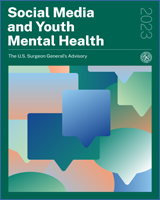Unless otherwise noted in the text, all material appearing in this work is in the public domain and may be reproduced without permission. Citation of the source is appreciated.
NCBI Bookshelf. A service of the National Library of Medicine, National Institutes of Health.
Social media use by youth is nearly universal. Up to 95% of youth ages 13–17 report using a social media platform, with more than a third saying they use social media “almost constantly.” Although age 13 is commonly the required minimum age used by social media platforms in the U.S., nearly 40% of children ages 8–12 use social media. Despite this widespread use among children and adolescents, robust independent safety analyses on the impact of social media on youth have not yet been conducted. There are increasing concerns among researchers, parents and caregivers, young people, healthcare experts, and others about the impact of social media on youth mental health.
Contents
- About the Advisory
- Social Media and Youth Mental Health
- Social Media Has Both Positive and Negative Impacts on Children and Adolescents
- What Drives Mental Health and Well-Being Concerns: A Snapshot of the Scientific Evidence
- Critical Questions Remain Unanswered
- We Must Take Action: A Way Forward
- Acknowledgments
- Endnotes
- NLM CatalogRelated NLM Catalog Entries
- Google for Sexual Relationships: Mixed-Methods Study on Digital Flirting and Online Dating Among Adolescent Youth and Young Adults.[JMIR Public Health Surveill. 2...]Google for Sexual Relationships: Mixed-Methods Study on Digital Flirting and Online Dating Among Adolescent Youth and Young Adults.Lykens J, Pilloton M, Silva C, Schlamm E, Wilburn K, Pence E. JMIR Public Health Surveill. 2019 May 16; 5(2):e10695. Epub 2019 May 16.
- Review Digital Platform Uses for Help and Support Seeking of Parents With Children Affected by Disabilities: Scoping Review.[J Med Internet Res. 2022]Review Digital Platform Uses for Help and Support Seeking of Parents With Children Affected by Disabilities: Scoping Review.Gruebner O, van Haasteren A, Hug A, Elayan S, Sykora M, Albanese E, Naslund J, Wolf M, Fadda M, von Rhein M. J Med Internet Res. 2022 Dec 6; 24(12):e37972. Epub 2022 Dec 6.
- Social media and online safety practices of young parents.[J Inf Sci. 2023]Social media and online safety practices of young parents.Greyson D, Chabot C, Mniszak C, Shoveller JA. J Inf Sci. 2023 Oct; 49(5):1344-1357. Epub 2021 Dec 14.
- Review Social Media Use and Health and Well-being of Lesbian, Gay, Bisexual, Transgender, and Queer Youth: Systematic Review.[J Med Internet Res. 2022]Review Social Media Use and Health and Well-being of Lesbian, Gay, Bisexual, Transgender, and Queer Youth: Systematic Review.Berger MN, Taba M, Marino JL, Lim MSC, Skinner SR. J Med Internet Res. 2022 Sep 21; 24(9):e38449. Epub 2022 Sep 21.
- Online Mental Health Animations for Young People: Qualitative Empirical Thematic Analysis and Knowledge Transfer.[J Med Internet Res. 2021]Online Mental Health Animations for Young People: Qualitative Empirical Thematic Analysis and Knowledge Transfer.Coughlan H, Quin D, O'Brien K, Healy C, Deacon J, Kavanagh N, Humphries N, Clarke MC, Cannon M. J Med Internet Res. 2021 Feb 9; 23(2):e21338. Epub 2021 Feb 9.
- Social Media and Youth Mental HealthSocial Media and Youth Mental Health
Your browsing activity is empty.
Activity recording is turned off.
See more...
